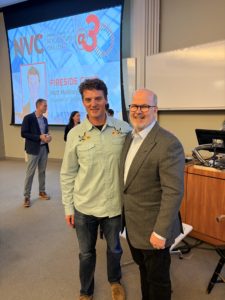NVC@30 Fireside Chat with Grubhub Cofounder Matt Maloney Highlights the Power of Persistence
 The Polsky Center kicked off its NVC@30 Fireside Chat series with one of the more prominent faces of the New Venture Challenge — Matt Maloney, MBA ’10, cofounder of Grubhub and winner of the 2006 Edward L. Kaplan, ’71 New Venture Challenge (NVC). Moderated by Mark Tebbe, adjunct professor of entrepreneurship at Chicago Booth and entrepreneur-in-residence at the Polsky Center, the discussion offered a candid look at the evolution of Maloney’s startup journey — from bootstrapping in Chicago to leading one of the top food delivery platforms.
The Polsky Center kicked off its NVC@30 Fireside Chat series with one of the more prominent faces of the New Venture Challenge — Matt Maloney, MBA ’10, cofounder of Grubhub and winner of the 2006 Edward L. Kaplan, ’71 New Venture Challenge (NVC). Moderated by Mark Tebbe, adjunct professor of entrepreneurship at Chicago Booth and entrepreneur-in-residence at the Polsky Center, the discussion offered a candid look at the evolution of Maloney’s startup journey — from bootstrapping in Chicago to leading one of the top food delivery platforms.
To kick off the conversation, Steve Kaplan, the Neubauer Family Distinguished Service Professor of Entrepreneurship and Finance and faculty director of the Polsky Center, recalled Maloney’s path to the NVC.
“Matt first applied and didn’t get in,” Kaplan shared. “He came into my office, explained how his business worked, and I said, ‘Well, you didn’t write that in your plan.’ So with that, he got in – and as you all know – he then won.”
Building Grubhub
Initially, his plan was to generate advertising revenue from restaurants through premium placements on the website. But traction was slow, and it quickly became clear the model wasn’t working. After revisiting the plan, Maloney pivoted toward delivery, aligning Grubhub’s business model directly with restaurant performance.

Maloney and Tebbe
“Once I could say, ‘I make a dime when you make a dollar,’ that’s when everything changed,” he explained.
When Maloney came to Booth and entered Grubhub into the 2006 New Venture Challenge, he was a part-time student who admits he “had never taken a business or finance class” before.
“I had a business that worked, but I didn’t know how to run it properly and communicate it to investors,” he said. “That’s the reason I came to Booth.”
During the competition, Maloney leaned heavily on Booth faculty and Polsky Center mentors for feedback.
“We bombed our first pitch,” he admitted. “After that, we went to every faculty advisor we could.”
Running a growing company while pursuing his MBA gave Maloney the opportunity to apply classroom lessons in real time.
“I was in a marketing class when the professor said the easiest conversion is a repeat customer,” he recalled. “Later that day, I sent an email to all our customers asking them to order again—and it ended up being the biggest day we’d ever had.”
The classes and program gave him the lessons and framework to refine his pitch — and ultimately win the NVC.
“We won first place and I immediately went all in.”
From Startup to Scale
After winning the 2006 New Venture Challenge, Maloney found that validation didn’t instantly translate into funding.
“We spent the whole summer pitching and got nothing,” he said. “One investor told me it was a great idea, but it would take a lot longer than I thought — and they were right.”
Still determined, Maloney and his team continued to refine the business, eventually closing their first round of funding in late 2007. Expansion soon followed — first to San Francisco, Boston, and New York — as Grubhub began proving its model across major U.S. cities.
As the company scaled, Maloney leaned heavily on data to drive decisions.
“We had a lot of data that strongly supported our scaling,” he said. “Because of that, we knew early on that Grubhub could be a good public company. And at that time, that was the typical goal for a startup like ours.”
That intuition proved correct. In 2014, Grubhub went public following its merger with Seamless, cementing its place as a leader in the expanding online food delivery market.
Maloney led the company until 2020, when Grubhub was sold to Netherlands-based Just Eat Takeaway for $7.3 billion in stock.
Lessons for the Next Generation of Entrepreneurs
Now exploring new ventures, Maloney reflected on two decades of entrepreneurship.
“Being an entrepreneur is about persistence,” he said. “There are massive highs and lows. The successful ones are the people who stick with it longest.”
When asked what advice he’d offer the next generation of NVC teams, Maloney didn’t hesitate.
“Just do it. If you believe, go all in,” he said. “It’s a hobby until you make it your job. Once you take that leap, you can’t ignore problems anymore — and that’s when real progress happens.”
The event marked the first in a yearlong NVC@30 celebration honoring three decades of the Edward L. Kaplan, ’71 New Venture Challenge, Chicago Booth’s nationally ranked startup accelerator. Future fireside chats will feature conversations with other NVC alumni founders, highlighting how Booth’s entrepreneurial ecosystem continues to shape the next generation of innovators.